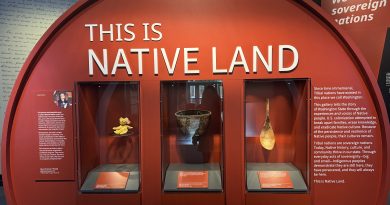Christianity is one of many misunderstood religions in America
Stereotypes and misconceptions about religion in the U.S. have caused significant changes in social discourse on religion and its role in both American and human history.
Religion has been around for a long time in recorded human history, with Christianity dating back to the first century C.E. Whether you believe in any religion today or not, we can’t deny they are still around and influence the human condition.
Many have claimed that the United States has been a Christian nation since its founding, with people arguing that saying the pledge’s “One Nation under God” makes the country inherently Christian. This is a stereotype, or a common misconception about the country. There are people in government who identify as Christian, but ultimately this is a republic run on national politics, not religion.
According to Congress.gov, the Constitution states, “congress shall make no law respecting an establishment of religion, or prohibiting the free exercise thereof.”
This article is a first in an ongoing series where I will explore some of the world’s most recognized religions, along with some not as widely known. I will explore and interpret each in my view of what they mean for humanity, attempting to clear up some stereotypes and misunderstandings. I, myself am a Christian, but I’m also a writer and a student of theology and history. I love everything that has to do with questioning what it means to be human.
The misconception I have come across online and in my interactions with people the most is the idea that Christianity was a religion created by white men. This is just not true. Theologians agree that Christianity was founded on the day of Pentecost in Jerusalem shortly after Jesus ascended to heaven and spread from there.
It was not until later, in the book “Acts of the Apostles,” chapter 11 verse 26, that the followers of Jesus were called Christian for the first time in Antioch, a city in Ancient Greece, according to the Bible.
The history of the religion includes the missionary efforts of the Apostle Paul, who embarked on journeys to cities such as Phillipi, Thessaloniki and Veria, leading to the first followers, who were women, men and children. The religion would later spread across the Middle East and to the rest of the world.
A well-known Jewish historian, Flavious Josephus, who lived in the first century C.E., wrote about the followers of Jesus in his book “Antiquities,” according to the World History Encyclopedia website.
“Sometimes we think that Christianity is a western idea,” said Leo Melendez, a youth pastor at Centro de Vida, an evangelical multicultural church in Tacoma. “Another misconception is that Christianity is misogynistic, is antiquated, or anti-science.”
Today there are still church circles where the idea of women pastors are seen as unbiblical. However, at Centro de Vida, the church has a female pastor, and they see having a woman in this role as a wholly biblical uplifting of women.
“No one is left behind. There is no one who is not able to be used by the Lord or walk out their God-Given calling or God-Given leadership,” said Melendez.

They aren’t alone because the Evangelical Lutheran Church in America reported in 2022 that 40% of pastors on the roster were women. In addition, the report “State of Clergywomen in the United States: A Statistical Update” by Rev. Dr. Eileen R. Campbell-Reed published in 2018, found that in 1960 2.3% of clergy in the U.S. were women. In 2016, the number went up to 20.7%, alongside an 82% rise in the U.S. population.
The idea of Christianity being antiquated has been argued for a long time and there is much literature on the subject. But the question I have is if Christianity is antiquated, why are some youths still attending church?
“A lot of them come because mom and dad drag them here,” said Melendez. “Reluctant toward Christianity probably because the way it’s portrayed by society.”
Melendez explained that the youth he ministers to are mostly the children of parents who emigrated to the U.S. The cultural shift brings its own challenges and then there’s the issues of identity, self-esteem, mental health and cultural stigmas that can be difficult to traverse for anyone.
“Post Covid, I would say the struggle we’ve seen is mental health, depression and anxiety,” Melendez said. “What’s unique about this generation is they’re a lot more vocal about those issues. The shutdown had a big effect on the youth. Seeing them still healing from that and now I think we’re finally seeing the light at the end of the tunnel.”
According to the Pew Research survey done in 2019, 63% of teenagers from ages 13 to 17 identified as religious. The findings were that the teens just followed their parents and were in line with their beliefs, but they might not think religion is nearly as important as their parents might view it.
This proves that Christianity is not a brainwashing religion or belief system, which is another misconception fueled in part by the media and by social constructs. The stigma that it’s just some blind belief with no facts or evidence is wrong. Again, there is plenty of literature that discusses who Jesus is or was, and his followers from all types of angles, not just heavily religious ones.
We can point to tradition as another reason people attend church. But at some point, faith in a religion becomes something people either reject or bring into their life, often during difficult times. The pandemic and the shutdowns brought this to the forefront for everyone. We all realized the need for community and some of us also saw the need for faith anchored in something higher than institutions.
“Christianity is not about us doing a bunch of good things to try to make it to heaven or get blessings,” Melendez said. “It highlights a God, a creator that is not distant from us, but actually opens up a pathway for us to be in an intimate relationship with him.”
For a religion that has been viewed as one that doesn’t take science seriously for years, I think that respect for the sciences has been displayed by many Christians. Still, to place everyone in the same flawed mindset is wrong and unbeneficial for society.
There is a docuseries, “Is Genesis History?” where the creator and host Dr. Del Tackett who has earned a P.H. D. in computer science, speaks with various scientists from different fields of study who identify as Christian. Together, they explore how science and the Bible don’t have to be combative but really can work together when you take each for what they are.
The Bible is not a science textbook by any means, but it speaks to the human condition and God’s view of it. However, science can’t give a definitive answer to the human condition. At best, science can experiment and give us an understanding of how things around us function and work. Science also can’t provide insight or moral reasoning to determine right from wrong.
“I wish more people would understand that Christianity is not about a list of rules. It really is about a God that desires relationship with us.” Melendez said. “That relationship changes everything that our hearts are seeking for in regard to affirmation, feelings of purpose and identity.”
Through studying history, I’ve seen how much turmoil has been brought into the world with people taking the name of certain religions and doing horrible things, often using religion to justify their actions. Each religion’s community should have a chance to say that this harm is not what they practice nor what their values are or what their beliefs look like.
In the U.S. we have a chance to see other religious practices and admire what is intriguing about them, while at the same time ask questions about what we see. This is how misconceptions should be cleared up so people can better understand others.
For the country to experience true religious freedom socially, we must be willing to ask questions and remain open-minded about the answers.






